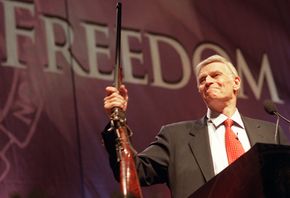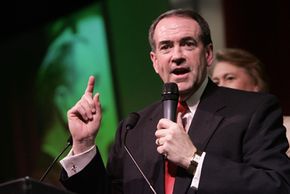When you've got a group of people who share similar ideas, you've got yourself a special interest group. And when everyone in your group works together to persuade politicians to legislate in your group's best interests, you've got power.
Special interest groups come in all shapes and sizes and cover topics in which many people are interested -- like the payday loan industry and tobacco companies -- to more specialized organizations, like the bands and orchestras lobby [source: Follow The Money].
Advertisement
When a few separate groups join together and hire a third party to speak for them you've got a lobby. Lobbyists are people who meet with legislators on behalf of the people who pay them. Take, for example, the gun lobby. The National Rifle Association and arms manufacturers want to protect the Second Amendment, which gives Americans the right to keep and use guns. So they pool their money together and hire a lobbyist who will attempt to persuade legislators to vote in favor of bills that support the Second Amendment and oppose those that favor gun control.
In recent years there have been massive government overhauls to reduce the power lobbies can have over candidates' decision making. The Honest Leadership and Open Government Act of 2007 prohibits lobbyists from bestowing gifts and travel onto lawmakers [source: Sunlight Foundation].
The McCain-Feingold Act of 2002 limits massive contributions to political parties by banning soft money -- unregulated contributions -- during federal elections by corporations, special interest groups and the wealthy [source: Hoover Institution].
But even with all of these new regulations, special interest groups can help candidates. They can endorse a candidate to their members, for example. And some types -- like labor unions -- coordinate with campaigns and provide volunteers.
There are, however, some special interest groups that can actually be detrimental to a candidate's campaign. In fact, some groups are dedicated to hurting campaigns. Read about some of the dirty tricks special interest groups have committed in elections on the next page.
Advertisement

